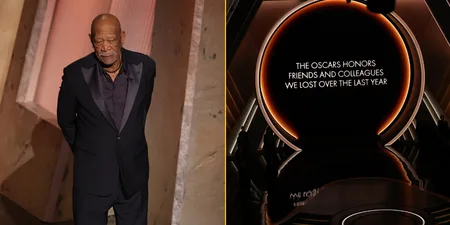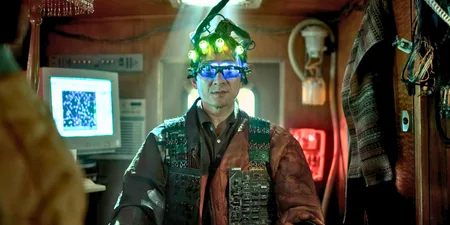Brought to you by Time to Change
Scotty Rawk bursts onto the stage like a ball of energy
As Queens of the Stone Age blasts through the PA, Scotty and his tag team partner, Cole Quinzel, wear flashing light-up masks and headbang on the entrance ramp. They rush down to the ring and the crowd goes wild.
Most of the time though, Scotty Rawk is not Scotty Rawk. He is 20-year-old Connor Gregory, from Grimsby. For the last four or five years, Gregory has lived with Depression and Generalised Anxiety Disorder. It has led to him struggling with alcoholism, and experiencing heavy suicidal thoughts.
But when he’s in the ring, all that goes away.
“Wrestling has helped me live with my mental health issues,” Gregory says.
“Wrestling in front of crowds, whether it’s 40 people or 400 people, is escapism. When you come out of the curtain you leave your individual mind-set backstage, because your energy is focussed on portraying a different character to entertain others. You quite literally get to be a different person for half an hour.”
Professional wrestling is a strange beast. It is fake fighting, sometimes pretending to be real, sometimes embracing its own unreality. It is at once both a stunt show and a soap opera. The results are predetermined, but the moves are still dangerous. Its appeal lies in the blurring of reality, in bring superheroes and supervillains to life, right in front of your eyes, in the real world. Those who don’t get it deride it, calling it fake and childish. But for those who buy into the illusion, it creates a fascinating world to become obsessed with.

To the general population, the image of wrestling is still the WWE – the American stadium-filling behemoth, pushing a glossy brand of sports-entertainment heavy on pyrotechnics and 6ft 5 Adonises. But away from that, there is an exciting independent scene, especially in the UK.
And if the WWE is Coldplay or U2 filling arenas, indie wrestling is like an underground punk scene, with people putting on shows for love not money, and building a community of like-minded outsiders. Rings in leisure centres, music venues, and community theatres, with independent wrestlers hustling their merch after the shows, and passionate fans mixing freely with their idols.
And just like punk rock, it seems to be saving people’s lives.
Gregory has been training for four years, and actually wrestling on shows for three. He says that it was just before he left for university that his mental health plummeted. “My passion for everything had somewhat disappeared,” he says.
But then wrestling gave him a life-line. A new promotion, British Wrestling Revolution, was starting up in his home town. Gregory got involved, and it rekindled his passion for the sport. He made friends with the people he trained with, and helped build the company from the ground up. It gave himself a purpose, and somewhere to belong to. He found a place to train closer to his university, and managed to finish his degree (“I thought I’d have given up on it, or genuinely ended my life before the course was over”).

“It’s the wrestling community, the people I would call family, that have helped me the most,” he says. “The people I’ve trained with, the people I’ve worked with, the people that share the same passions as me, that are the same people that saw me sink into depression and contemplate suicide. But they dragged me from that, rekindled my passion and pushed my life in another direction.
“And for those people, for this community of British wrestling, I am so grateful.”
It is not just the wrestlers themselves the indie scene is helping – in the process of writing this I’ve spoken to fans all over the world that told me that wrestling has saved them. A girl from Western Australia whose local scene helped her get over a violent relationship. Another girl from Germany, who through wrestling managed to escape a difficult home life both mentally and physically. A young trans man adopted by underground Pennsylvania-based wrestling company Chikara, after his biological family rejected him.
Even just being a fan, indie wrestling gives people a community and a sense of identity. Chris Ridgeway is a wrestler on the British scene who has also lived with depression, and sees what the fans get from it.
“People I think get quite proud of being a wrestling fan,” Ridgeway explains. “That’s their little thing that they can control. They like this person or that person, and they’ll watch their matches and buy their t-shirts. They’ll listen to the same music that they listen to. It’s really cool that they get to do that, I don’t think there are many other sports or environments where you would be able to do that.”

“Fans come up to me at the merch stand, and say a particular match is something they go to to escape, because they enjoy it so much – ‘I watch that match and I forget about what’s going on’. They just get to come out of whatever the hell is going on in their life.
“At the end of the day, most of us wrestlers are just really normal human beings, and we were all wrestling fans at some point. We all had that outcasted feeling [the fans have].”
The people that run these companies are fans themselves, and a new breed of promotions are creating safe spaces where everyone is welcome. That’s the tagline of PROGRESS Wrestling, who have been one of the leading names in the resurgence of wrestling in the UK, going from 350 capacity venues to holding a show at Wembley Arena last month in just five years. PROGRESS co-owner, and author of a great book of the history of wrestling, Jim Smallman has been open with his own mental health issues, and found himself someone as someone that fans have come to for advice.
“Most of the DMs I get are nice ones from fans saying PROGRESS helped them through a rough time and they’re through the worst now, but I’ve had some specific messages asking for help which I’ll always try to do,” he says.
“Some concerning cutting back on drinking or drugs, with me being straight edge for 20 years now; or dealing with grief because I was very open about the loss of my mother a few years ago, or just coping with anxiety enough to be able to come to a show. I’m by no means a qualified councilor, but I always believe in talking and even if it takes me a couple of days to get back to peoples DMs, I always do.”
Josh Bevan, who runs Riptide Wrestling in Brighton, told me he gets similar messages. “Really often we’ll get emails from people telling us that that Riptide has helped them process things, physical and mental. Traumatic life events, bereavements, things like that, you know. Heavy, heavy shit man”.

Bevan, who himself had a stress-induced mental health event prior to being involved with wrestling, says that he thinks that there is something unique about the fake sport that can reach people in a way no other art form can.
“Pro wrestling saved my life seems more common in pro wrestling than other places. You just wonder if it’s something to do with the medium? Or does it attract a vulnerable fanbase, and that’s why there’s a high incidence of this stuff? Is it better at helping people than other mediums?”
He thinks it might have something to do with the way it blends fiction and the real world. “It lies on a fault line between reality and escapism,” he continues. “It’s like they’re dragging a piece of their imagination into the real world. Your escapism is there in front of you – but it is wild and fantastic and wonderful and it isn’t the real world.
“You are left with more than a gig. Yes, music can be magical, but there was nothing otherworldly – you weren’t watching fucking superheroes out there”.
Maybe that’s it. One of the things that makes mental health issues so difficult to handle is that there are often no visible symptoms. The problems are often all contained in the heads of those who experience it, with nothing for the outside world to see. It is very difficult to process. As well as being a welcoming and supportive community, wrestling is this bizarre, wonderful, alternate universe you can escape to – whether you are a performer yourself in the ring, or cheering them on from the side, it’s a world that is there when you need it.






































